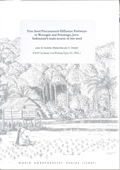| Working Paper Series |
 |
|
| Title | Tree seed procurement-diffusion pathways in Wonogiri and Ponorogo, Java: Indonesia's main source of tree seed | | Author | James M Roshetko, Mulawarman and A.Dianarto | | Year | 2004 | | Project series (series title) | ICRAF Southeast Asia Working Paper No. 2004_1 | | Publisher | World Agroforestry Centre - ICRAF, SEA Regional Office | | City of Publication | Bogor, Indonesia | | Number of Pages | 16 | | Physic description | ill ; 29 cm | | Call Number | WP0006-04 | | Keywords | Tree Seed, Seedlings, Java, Indonesia, Seed Supliers, Seed Collections |
|
| Abstract: |
| Wonogiri Central Java ang Ponorogo, East Java are neighboring districts (kabupaten). Forty-two percent of their land area is convered with secondary forests comprised primarily of naturalized exotic tree species that are common components of governmental land rehabilitation programs. The seed suppliers operating in the Wonogiri-Ponorogo area represent only 9 % of the suppliers in Indonesia yet they process 90-80% of the national tree seed capacity. Wonogiri-Ponorogo suppliers procure and suppliers; 1148 tons area sold to customers across Indonesia; a small fraction is exported. Seventy-two percent of the seed sold (826 tons) is collected in the Wonogiri-Ponorogo area. The remainder originates in Sumatra, Madura dan Nusa Tenggara. In Wonogiri-Ponorogo tree seed is collected by seed companies and middlemen, who sell sees to customers. Government agencies purchase 75 % of the seed. Cover crop species, Gmelina arborea, Tectona grnadis and Leucaena leucocephala account impact on seed quality. Fortunately, the sheer volume of seed collected in Wonogiri-Ponorogo assure that it comes from a large number of unrelated trees over widely dispered locations. Simple seed collection guidelines would help farmers improve their seed collection practices and the genetic quality of seed collected. A commitment to seed quality by all agents and customers is required to income for all seed agents. As the dominant agents who facilitate most of the activities and inputs required to move seed through the pathway from forest to customers, companies benefits most. Based on the quantities of seed reported sold, companies' ang middlemens's annual revenues are Rp 765 million to Rp 22 million (US $90,000 to $2600). These estimates must be adjusted by subtracting estimate of profits. Neither accurate records or estimates of these costs are available. Farmers are the most numerous agent, an estimated 22,500 farmers are involved in seed collection activities annually. Farmers earn Rp 795,000 to Rp 275,000 from seed collection annually, or 66-33 % of their 3-month dry-season income. Farm families living near seed companies earn additional income by processing. |
|
|
Download file(s): Click icon to download/open file.
|
| |
File Size |
Description |

|
553 KB |
Softcopy |
|
|
|
| Viewed in 2334 times. Downloaded in 769 times. |